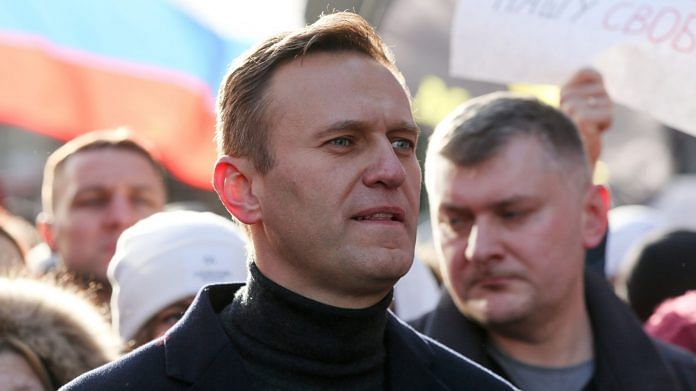New Delhi: Russian opposition leader and journalist Alexei Navalny was poisoned by a Novichok nerve agent, which was developed by the erstwhile Soviet Union’s military during the Cold War era, the German government revealed.
In a statement Wednesday, German Chancellor Angela Merkel said testing by a special military laboratory had shown “proof without doubt” that chemical agent Novichok was used to poison 44-year-old Navalny, who is a staunch critic of Russian President Vladimir Putin.
Navalny was airlifted to Berlin for treatment after he fell ill on a flight back to Moscow from Siberia last month. He has been in a medically-induced coma ever since.
In her statement, Merkel also said Navalny was “the victim of a crime that intended to silence him”. The Russian government, however, has denied any involvement in his poisoning.
ThePrint explains what the Soviet-era Novichok nerve agents are and past instances of poisonings using these agents.
Also read: Putin critic Alexei Navalny is latest Russian dissident to be poisoned & why Belarus on fire
What is Novichok?
Novichok is a deadly group of nerve agents developed by the Union of Socialist Soviet Republic (USSR) military, under a programme codenamed ‘Foliant’, in the 1970s and 80s — the last two decades of the Cold War. The term, ‘Novichok’, means “newcomer” in Russian.
Nerve agents, also called nerve gas, are chemicals that disrupt the central nervous system. They inhibit neurotransmitters and cause contraction of muscles. This then leads to organ failure, cardiac arrest and suffocation as fluid starts filling the lungs, eventually leading to death.
This Novichak group of nerve agents was reportedly developed in a “top-secret laboratory” in Moscow and was once a closely held secret of the Russian government, who wanted to create chemical agents that were both lethal and difficult to trace.
The existence of Novichok was first brought to light by a Russian chemist, Dr Vil Mirzayanov, in the 1990s through the Russian media.
Mirzayanov, who had worked in Moscow’s State Union Scientific Research Institute for Organic Chemistry and Technology for 30 years, defected to the US in 1995 where he published the chemical formula in his book ‘State Secrets‘ in 2007.
In a report published by Washington’s Stimson Center in 1995, he revealed that Novichok agents were secretly developed at the research centre in Moscow.
Some variants of Novichok take effect rapidly, within 30 seconds to two minutes. These nerve agents can be administered through inhalation, ingestion or can also be absorbed by the skin.
Novichok agents can be solid, liquid, gas, or aerosol. Solid agents can be dispersed in the air by powdering them.
Novichok variants & past instances of poisoning
Some variants of Novichok are said to be more toxic than others. One of them, known as Novichok-5, is believed to be five to eight times deadlier than the VX nerve agent, which was used to kill North Korean ruler Kim Jong-un’s half-brother in 2017. Kim Jong Nam was doused with a high dosage of the VX nerve agent and he died within 15-20 minutes.
However, there is little clarity on how long the toxin retains its potency. Mirzayanov claimed that it doesn’t last for months.
But according to Russian scientist Vladimir Uglev, who claimed that he had invented the Novichok agent that was used to poison former Russian spy Sergei Skripal and his daughter Yulia in 2018, it is a “very stable” substance.
Skripal was a former Russian spy accused of being a double agent and spying for the British. In 2018, he and his daughter Yulia were poisoned by a Novichok nerve agent in Salisbury, UK. While they survived the poisoning, the Russian government had denied any involvement in the incident.
In another incident, US-based activist and Putin critic Vladimir Kara-Murza fell into a coma after he was poisoned twice, in 2015 and 2017. Kara-Murza has revealed that he suffered symptoms similar to Navalny.
His poisoning still remains a mystery and according to his hospital’s diagnosis, Kara-Murza had been poisoned by a “toxic influence of an unknown substance”.
Antidote
According to Mirzayanov’s book, atropine and athene were antidotes for the nerve agents but they only helped stop the poison’s actions and were not a cure.
The antidote needs to be administered to the victim as soon as possible to counteract the poison. However, the process of identifying the poison often delays the antidote administration.
When a person is exposed to nerve agents, their clothing also needs to be removed immediately and their skin must be washed with soap and water. Their eyes must be rinsed and oxygen support provided too.
Also read: Putin cemented his future, but Russia faces key hurdles ahead — from economy to foreign policy




1) Novichok is so deadly that Russia poisoned him enough that he would survive instead of killing him just like another botch up in Salisbury.
2) After he fell ill, the Russian govt airlifted him to a hospital in Siberia, where they had another opportunity to kill him but they didnt and instead allowed him to be airlifted to Germany.
3) Dont believe Russia but yes believe Germany who does not have an agenda to defame Russia.
For every 10 good articles you put up, a few bad ones like these always make you similar to the mainstream media with their 4AM talking points and yes despite that you want our donation to support you. The irony is not lost on us, so no, we will keep our hard earned money with us. I expect another agenda driven article on this topic soon, so good luck.